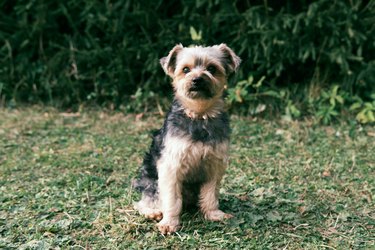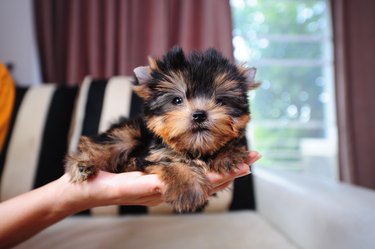The lure of a teeny tiny Yorkshire terrier cannot be denied — the photo opportunities are endless. If you're looking for a purse-sized dog, there are a few things to know. First, there is no recognized breed of "teacup" dog, including a Yorkie. Second, dogs beneath their weight standard often have a host of health problems and a shortened life span.

Video of the Day
Lifespan of a Yorkie
The American Kennel Club recognizes the Yorkshire terrier as a member of its toy group because of the breed's size and heritage. When bred to the AKC's standard, the Yorkie stands between eight and nine inches tall and weighs between four and seven pounds — hardly a heavyweight. A healthy Yorkie life expectancy ranges between 11 and 15 years, though it depends on their health.
Video of the Day
The lifespan of a Yorkie depends on if they have any of the health risks associated with their breed, which include hypoglycemia, hypothyroidism, collapsing trachea, luxating patella (dislocated kneecap), and the liver defect portosystemic shunt.
Teacup dog breeds standards
Generally, a "teacup" dog refers to a dog smaller than its breed standard, so in the case of a Yorkshire terrier, that's a dog weighing less than four pounds. To put it in perspective, a teacup Yorkie weighs less than the half-gallon of milk in your refrigerator. Sometimes a Yorkshire terrier will come in below that weight range, through no effort of the breeder. However, some breeders purposely breed smaller than normal Yorkies — the "runts" of their litters — to produce smaller than normal "teacup" Yorkies.
Teacup dog breeds health conditions

According to the Yorkshire Terrier Club of America smaller than normal Yorkshire terriers are prone to a wide variety of medical issues, beyond the hereditary problems the breed is naturally vulnerable to developing. Vomiting, diarrhea, and undetected birth defects are common among teacup Yorkies. As well, these little dogs don't fare well under anesthesia, making additional testing necessary before they undergo even routine surgery. Their small size also makes them easily injured in the event of a fall or being stepped on. As with all toy breeds, Yorkshire terriers have hereditary dental issues, which makes taking care of their dental health a priority.
Ideally, the life span of a teacup Yorkie would be in the same range of their larger relatives, however, these dogs often die at a much younger age. There is no stated life expectancy for teacup Yorkies since health and quality can vary widely.
Check teacup dog breeds health
Teacup Yorkies are not recognized by any major canine association. There is no standard for a teacup Yorkie, so a breeder selling a teacup Yorkie can call any Yorkie a teacup. A breeder may claim that a puppy is a "teacup," though the dog may grow into a standard-sized dog. Genetics, nutrition, and medical care all contribute to a dog's adult size.
The Yorkshire Terrier Club of America states that most breeders will not breed a female Yorkie who weighs less than five pounds. The club also calls for an eye screening to check for eye diseases, cataracts, and other problems, as well as a knee screening to look for a luxating patella.

If you're in the market for a tiny Yorkie, do your homework to ensure your breeder's dogs are listed in the Canine Health Information Center database, sponsored by the AKC Canine Health Foundation (CHF) and the Orthopedic Foundation for Animals, to help ensure you'll be getting a healthy puppy. You should also choose to work with a responsible breeder, which you can find by searching the AKC's database.
Remember, the most important part of responsible dog ownership is selecting and taking care of a healthy dog so your canine-human bond can last for years to come.